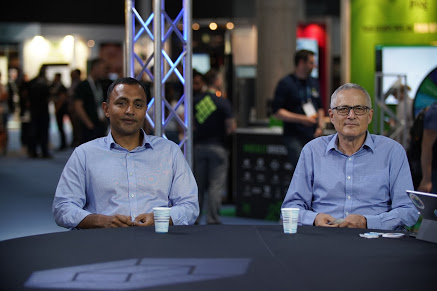 INFRA
INFRA
 INFRA
INFRA
 INFRA
INFRA
Many companies want to know more about cloud computing and the benefits of containerization, but have trouble accepting the changes necessary to thrive within the cloud-native ecosystem. Reduxio Systems Inc. is working with organizations so they can seamlessly transition to either cloud or container-native platforms, according to Ori Bendori (pictured, right), chief executive officer of Reduxio, and Jacob Cherian (pictured, left), chief marketing officer and vice president of product strategy at Reduxio.
Bendori and Cherian spoke with Stu Miniman (@stu), co-host of theCUBE, SiliconANGLE Media’s mobile livestreaming studio, and guest host and cloud economist Corey Quinn (@QuinnyPig) during the KubeCon + CloudNativeCon event in Barcelona, Spain. They discussed the properties of the container space and some of the upcoming company offerings customers can expect (see the full interview with transcript here). (* Disclosure below.)
[Editor’s note: The following answers have been condensed for clarity.]
Miniman: There’s a lot of complexity inside storage that doesn’t go away. How is Reduxio helping to solve that?
Cherian: As customers move applications from traditional infrastructures to storage to containerized infrastructure, I think the expectation is that these customers would expect the same capability that they had with the existing storage systems in the container native storage, because why would a customer move their applications to an environment that’s less capable?
Our focus is to deliver storage that is enterprise grade where customers feel comfortable moving their business-critical applications from the traditional environment into a container environment.
Miniman: When I talk to storage companies today, there are your traditional storage companies … and then I’ve got cloud-native people. Where do you fit in? What’s the industry getting right, and what differentiates your team?
Cherian: Let’s define container native first. I think that’s important because everybody says they’re cloud native. I think container native has unique value, because once you move to Kubernetes, you truly are building a cloud environment where you want all your work — everything to be running inside that Kubernetes cluster. This is really realization of … code where infrastructure is shared, physical resources are shared, and your networking, your applications and storage are just services that run on top of a physical infrastructure.
When we look at container native, the important attribute for container native is that it runs within Kubernetes. It’s implemented as containers, and it’s orchestrated and scales with Kubernetes. It should not be something that’s separate.
Miniman: What’s the rollout of your new [Magellan] offering?
Cherian: We’ve announced that we’ve started customer evaluations. We expect to start [proof of concepts] in about three months. And the product will be available for production by fall of this year.
Miniman: Where should people be looking for Reduxio, and what can we expect from the company throughout the year?
Bendori: We believe we are, in a way, the future of storage. Not because we’re that smart, but because it makes sense. This is the way the public cloud guys are building their stuff. It must be cloud native. It must be container native, because that is where the IT is moving to. In a way, we’re saying at the end of the day that storage needs to behave like everybody else. It cannot be the exception.
Storage must be part of the container ecosystem. We represent the first one, but there will be others. We’re not going to be alone, but we believe the direction we’re taking is the direction the storage industry will take.
Watch the complete video interview below, and be sure to check out more of SiliconANGLE’s and theCUBE’s coverage of the KubeCon + CloudNativeCon event. (* Disclosure: Reduxio Systems Inc. sponsored this segment of theCUBE. Neither Reduxio nor other sponsors have editorial control over content on theCUBE or SiliconANGLE.)
Support our mission to keep content open and free by engaging with theCUBE community. Join theCUBE’s Alumni Trust Network, where technology leaders connect, share intelligence and create opportunities.
Founded by tech visionaries John Furrier and Dave Vellante, SiliconANGLE Media has built a dynamic ecosystem of industry-leading digital media brands that reach 15+ million elite tech professionals. Our new proprietary theCUBE AI Video Cloud is breaking ground in audience interaction, leveraging theCUBEai.com neural network to help technology companies make data-driven decisions and stay at the forefront of industry conversations.